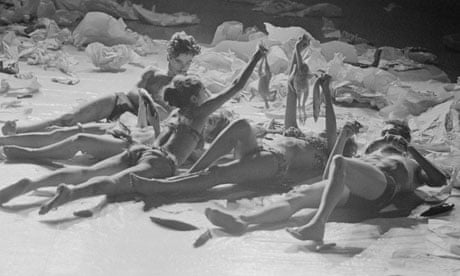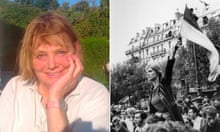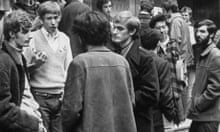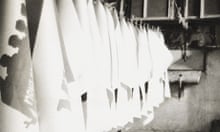What we consider the British counter-culture began in the mid-60s. There had always been a bohemian underground, a discreet gay scene and a community of artists, but they kept their heads down. Full employment had enabled the growth of youth culture – Mary Quant, the Beatles – but many young people wanted to be more than the youth section of the establishment. In LA, they called themselves freaks; in San Francisco, they were hippies; in New York, they were the underground – it was this term we used in London, despite Fleet Street's attempt to dub us Flower Children.
The underground was a catch-all sobriquet for a community of like-minded anti-establishment, anti-war, pro-rock'n'roll individuals, most of whom had a common interest in recreational drugs. They saw peace, exploring a widened area of consciousness, love and sexual experimentation as more worthy of their attention than entering the rat race. The straight, consumerist lifestyle was not to their liking, but they did not object to others living it. But at that time the middle classes still felt they had the right to impose their values on everyone else, which resulted in conflict.
The counterculture was apolitical, as far as party politics was concerned because most politicians were seen as lying hypocrites, serving vested interests, not the people. However, it was active in issue-based campaigns: CND, which many of them were involved in during the early 60s, and the anti-Vietnam war campaign which grew out of that. After 1967 came environmental issues, the gay liberation front and the women's movement.
My involvement came in 1965, when my flatmate John Hopkins (Hoppy) and I looked round the audience at the Albert Hall International Poetry Incarnation – a Beat generation event featuring Allen Ginsberg and Lawrence Ferlinghetti, among many others – and realised that there was no publication that even remotely catered to the interests of this community: 7,000 people at a poetry reading! We thought we had better start one ourselves, and after a few trial publications, Hoppy and I launched International Times (IT). We began as an arts paper, with theatrical reviews and interviews, but we also catered to the real interests of our readers. We had a gay column written by "Elizabeth" – homosexuality was still illegal, so a nom de plume was required – and a drug column (for which ditto) giving the price of pot in various cities and outing known undercover cops. It was not long before we were busted.
Can there still be a counterculture in the age of the internet, when a flashmob can assemble in a matter of hours and the latest cutting-edge art event is watched simultaneously across the globe? The strongest remnant of the old underground is the dopers, but as there are an estimated two to five million people regularly smoking marijuana in the UK, they can hardly be regarded as a countercultural phenomena; more as a major component of the multicultural society we live in.
The underground of IT, and later of ecstasy and raves, ended in the early 90s. You can't have a counterculture when the culture itself is multifaceted, but you can still have an avant garde and you can still drop out. Ultimately, the establishment feeds off the avant garde: street fashions inspire luxury brands, just as the advertising industry trawls the art world for ideas.
The underground papers were produced entirely for idealistic reasons, often communally, and the staff were frequently not paid. The same spirit applies to many experimental art events today. There are still musicians who don't want to be discovered by Simon Cowell. These people are at the cutting edge, breaking the rules of practice and taste, and sometimes the law. But it is more likely to be Saatchi and Saatchi that raids them than the police.
I like to think that Wikileaks is in the tradition of the underground press, particularly as the US is attempting to suppress it, just as it tried to undermine the underground papers that led the anti-Vietnam campaign. Wikileaks combines an old-fashioned "publish and be damned" ethos with the slightly reckless traditions of the underground press, though IT was far more reckless in its naming of undercover cops and informers than anything Wikileaks has done with its carefully redacted releases.
So is there a counterculture? The police certainly think so: infiltrating environmental groups and no doubt the student protest movement as well. Though the travellers are probably the only true countercultural group left in Britain trying to live a life free of interference and surveillance, the spirit lives on in the student protests, animal rights groups, environmental activists and the anti-globalisation movement. The establishment clamps down on resistance with one hand, while ripping off the underground arts with the other. In that respect, it's just like the 60s.









Comments (…)
Sign in or create your Guardian account to join the discussion